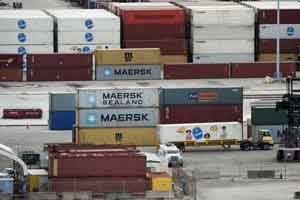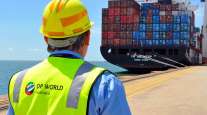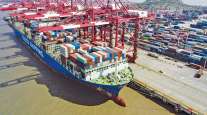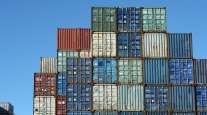Senior Reporter
Sen. John Thune Seeks FMC Examination of SOLAS Amendments

In a May 18 letter to FMC Chairman Mario Cordero, Sen. John Thune (R-S.D.) said that the nation’s exporters and importers from across the nation continue to raise concerns with the implementation of the “Safety of Life at Sea” requirement that beginning July 1 will no longer allow shippers to estimate the weight of a container before it goes on a ship.
The so-called SOLAS safety amendments will require that ocean vessels reject any container virtually anywhere in the world without a shipper-verified gross mass certification — the combined weight of the cargo and the container.
Thune asked FMC, which has said recently that it does not have jurisdiction on the issue, to “inform the committee of any appropriate actions to prevent unnecessary disruptions, delays or burdens to our nation’s supply chain.”
“Despite recent discussions and actions, there continues to be uncertainty and concern,” Thune wrote.
Thune asked that the commission respond to his request by May 31.
The SOLAS requirement, which primarily targets shippers, has sent ripples through much of the supply chain, including truckers who have concerns that they might be stuck with loads when visiting ports that do not have certified weight documents.
“The last thing we need after the last year-and-a-half of port congestion is further clogging of the system and not being paid after getting stuck with equipment you can’t get rid of,” said Curtis Whalen, executive director of American Trucking Associations’ Intermodal Motor Carriers Conference. “How is a trucker supposed to know before he gets to the gate of the terminal if all the certification requirements have been met?”
Whalen added, “It’s certainly going to be a mess come July 1.”
Some shippers also have said they are not happy with the new rule, claiming they are not equipped to do the weighing themselves and will have to outsource the task.
Although the International Maritime Organization, the United Nations specialized agency with responsibility for the safety and security of shipping and the prevention of marine pollution by ships, is standing pat on its July 1 effective date, earlier this month its Maritime Safety Committee asked that port authorities take a “practical and pragmatic” enforcement approach for the first three months.
“This would help ensure that any problems related to trans-shipped containers and the transmittal of electronic-verified gross mass data are resolved without impacting the smooth operation of the global logistics chain during the initial phasing-in period of the requirements,” an IMO spokeswoman said.
The new rule, designed to keep ships from tipping over in bad weather or rough seas, is well-intentioned, William Doyle, an FMC commissioner, told Transport Topics in a recent interview. Although incidents are rare, there have been ocean vessel accidents that resulted in hundreds or even thousands of containers being dumped overboard.
“As a person who has sailed on ships, I think it’s a proactive approach,” Doyle said. “It’s not necessarily about what’s happened in the past, it’s the fact that ships have gotten so much larger that you’re going to have so many more containers on deck.”




